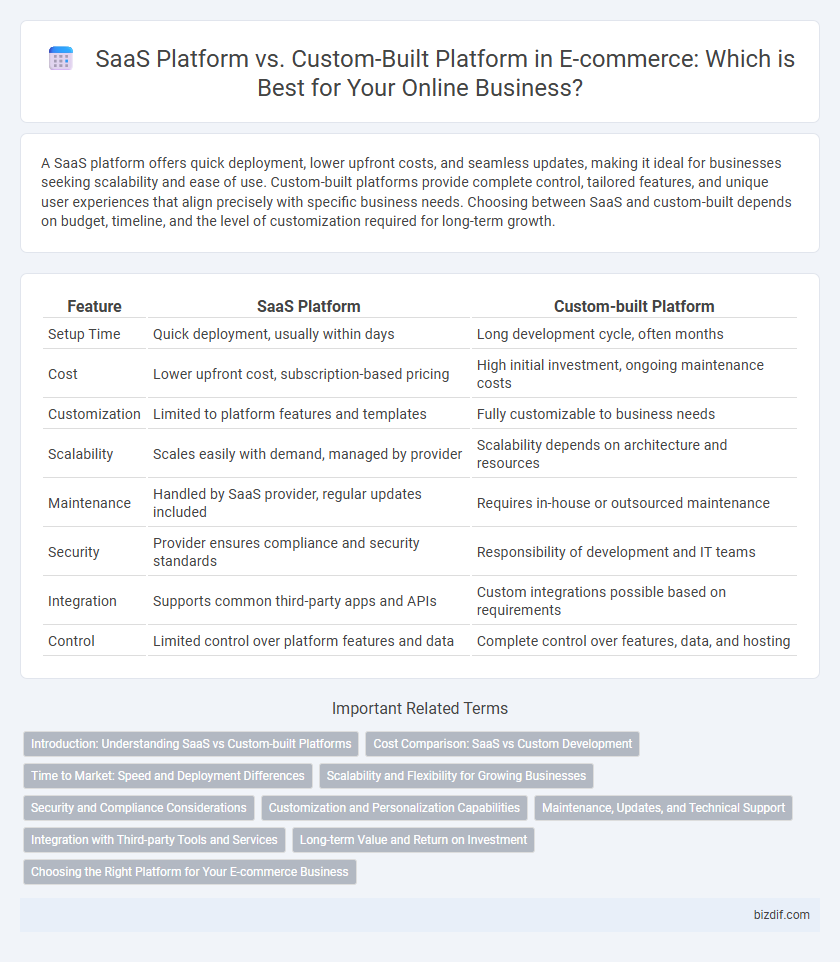A SaaS platform offers quick deployment, lower upfront costs, and seamless updates, making it ideal for businesses seeking scalability and ease of use. Custom-built platforms provide complete control, tailored features, and unique user experiences that align precisely with specific business needs. Choosing between SaaS and custom-built depends on budget, timeline, and the level of customization required for long-term growth.
Table of Comparison
| Feature | SaaS Platform | Custom-built Platform |
|---|---|---|
| Setup Time | Quick deployment, usually within days | Long development cycle, often months |
| Cost | Lower upfront cost, subscription-based pricing | High initial investment, ongoing maintenance costs |
| Customization | Limited to platform features and templates | Fully customizable to business needs |
| Scalability | Scales easily with demand, managed by provider | Scalability depends on architecture and resources |
| Maintenance | Handled by SaaS provider, regular updates included | Requires in-house or outsourced maintenance |
| Security | Provider ensures compliance and security standards | Responsibility of development and IT teams |
| Integration | Supports common third-party apps and APIs | Custom integrations possible based on requirements |
| Control | Limited control over platform features and data | Complete control over features, data, and hosting |
Introduction: Understanding SaaS vs Custom-built Platforms
SaaS platforms offer ready-made e-commerce solutions with scalable infrastructure, automatic updates, and lower upfront costs, enabling faster market entry for businesses. Custom-built platforms provide tailored functionality and unique user experiences, suited for companies with specific requirements and the resources to support ongoing development. Choosing between SaaS and custom-built hinges on factors like budget, time-to-market, scalability, and long-term customization needs.
Cost Comparison: SaaS vs Custom Development
SaaS e-commerce platforms typically offer lower upfront costs with subscription-based pricing, reducing financial barriers for businesses. Custom-built platforms require significant initial investment and ongoing maintenance expenses, often exceeding SaaS costs over time. While SaaS solutions provide predictable monthly fees, custom development allows tailored features but demands higher long-term budget commitments.
Time to Market: Speed and Deployment Differences
SaaS platforms offer rapid deployment with pre-built features, significantly reducing time to market for e-commerce businesses. Custom-built platforms require extensive development cycles, leading to longer launch timelines but provide tailored solutions for specific business needs. The speed advantage of SaaS accelerates initial sales, while custom builds demand more upfront investment in time before going live.
Scalability and Flexibility for Growing Businesses
SaaS platforms offer built-in scalability with automatic updates and maintenance, allowing growing e-commerce businesses to quickly adapt to increased demand without significant technical overhead. Custom-built platforms provide unmatched flexibility, enabling tailored features and unique integrations that precisely match evolving business needs but require more time and resources to scale. Choosing between SaaS and custom solutions depends on prioritizing rapid scalability and ease of use versus customizability and long-term control.
Security and Compliance Considerations
SaaS e-commerce platforms offer robust, built-in security features such as PCI DSS compliance, SSL encryption, and regular security updates managed by the provider, reducing the burden on merchants. Custom-built platforms require dedicated security expertise to implement strong measures like data encryption, firewall configuration, and compliance with regulations such as GDPR and CCPA, which can increase development time and costs. Choosing between the two depends on the organization's capacity to maintain ongoing security and compliance requirements in a dynamic e-commerce environment.
Customization and Personalization Capabilities
Custom-built e-commerce platforms offer unparalleled customization and personalization capabilities, allowing businesses to tailor every aspect of the user experience to specific customer segments and branding requirements. Unlike SaaS platforms, which provide standardized templates and limited configuration options, custom solutions enable deep integration with unique business processes and advanced customer data analytics for dynamic content delivery. This flexibility enhances customer engagement and conversion rates by delivering highly relevant and personalized shopping experiences.
Maintenance, Updates, and Technical Support
SaaS platforms offer streamlined maintenance and automatic updates, reducing the need for dedicated IT resources and ensuring continual access to the latest features and security patches. Custom-built platforms require ongoing manual maintenance by in-house or contracted developers, which can increase operational costs and extend recovery times for technical issues. Technical support for SaaS is typically included in subscription fees, providing timely expert assistance, whereas custom solutions often necessitate separate support contracts or internal teams for troubleshooting and updates.
Integration with Third-party Tools and Services
SaaS platforms offer seamless integration with numerous third-party tools and services through pre-built connectors and APIs, enabling rapid deployment and consistent updates. Custom-built platforms provide tailored integration options, allowing businesses to optimize workflows specific to their needs but often require more time and resources to develop and maintain. Choosing between these options depends on the importance of flexibility versus speed and the complexity of desired third-party integrations in the e-commerce environment.
Long-term Value and Return on Investment
SaaS e-commerce platforms offer scalable solutions with lower upfront costs, providing faster deployment and automatic updates that reduce long-term maintenance expenses. Custom-built platforms demand higher initial investments but allow for tailored features and full control, resulting in potentially greater ROI through unique customer experiences and operational efficiencies. Evaluating total cost of ownership, flexibility, and growth potential is critical to maximizing long-term value in e-commerce technology investments.
Choosing the Right Platform for Your E-commerce Business
Choosing the right e-commerce platform is crucial for scalability and user experience, with SaaS platforms offering quick deployment, lower upfront costs, and managed maintenance, ideal for startups and small businesses. Custom-built platforms provide tailored functionality, complete control over features, and seamless integration with existing systems, suitable for enterprises with unique requirements and technical resources. Evaluating factors such as budget, business size, technical expertise, and long-term growth plans ensures optimal alignment with your e-commerce goals.
SaaS Platform vs Custom-built Platform Infographic

 bizdif.com
bizdif.com